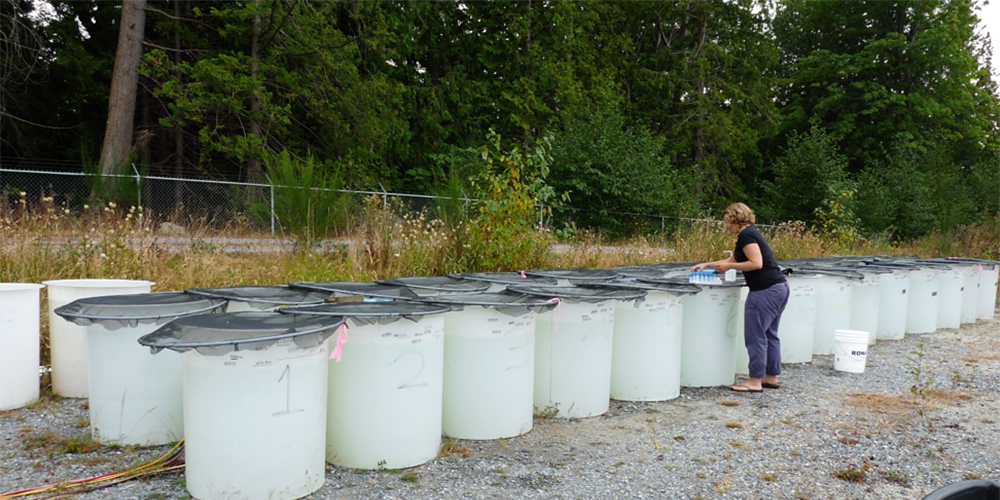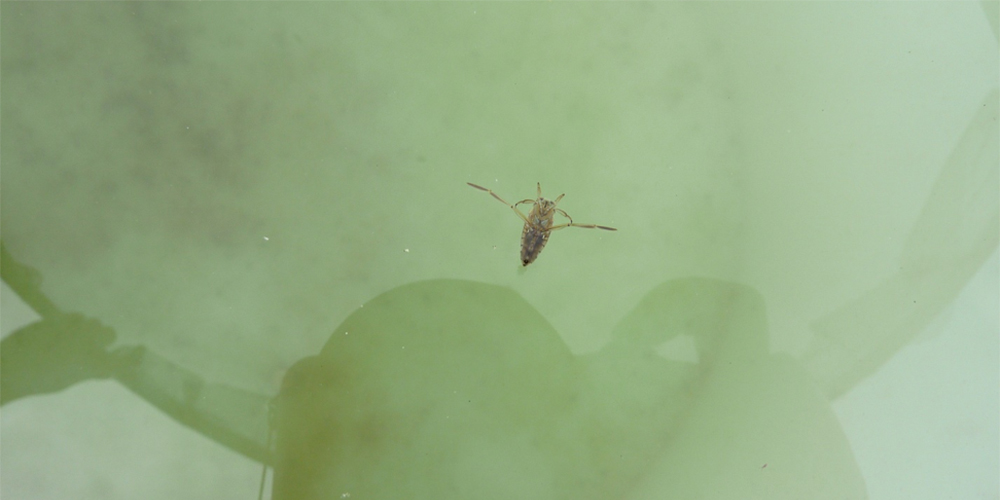
Postdoctoral researcher, Dr. Jessica Garzke, conducting the experiment
Climate change and biodiversity change are two major ecological crises of our time, but new research finds that whether ecosystems can adapt to such pressures may depend on the presence of predators. In an experiment, University of British Columbia researchers found that when predators were not present in the ecosystem, the overall biomass and abundance of algae declined greatly with increasing temperature, leaving less energy available for all organisms.
Dr. Jessica Garzke, the study’s lead author and postdoctoral fellow in the Institute for the Oceans and Fisheries, and Dr. Mary O’Connor, senior author on the paper and professor in UBC’s Department of Zoology, explain why this might have happened.
What were you investigating?

Dr. Jessica Garzke
How did you set up this experiment?
JG: To test our hypothesis, we created a series of independent freshwater tank ecosystems, and filled each tank in one of three ways to reflect different trophic structures: with algae only, with algae and grazers, or with algae, grazers and predators. We created multiple tanks for each trophic structure and set each to a different temperature, ranging from 19 to 30°C, to see how increasing temperatures might affect ecosystems when different species are present. We then tracked changes in these tanks over 9 weeks.
What were your main findings?
MO: We found that warming had a bigger impact on the ecosystem when predators were not present. In our case, these predators were aquatic insects called notonectids, which prey on zooplankton.
In the tanks where there were notonectids, we found that the algae biomass was relatively high, meaning there was a lot of energy still available for organisms in that ecosystem even when temperatures increased. However, when notonectids were not present the abundance of algae declined greatly with higher temperature, leaving less food available overall. This highlights the key role of predators in ecosystems, and how they may be crucial to helping ecosystems adapt to warming.
Anything surprising about what you found?
JG: Yes! While we found that, at high temperatures, there was less food available for zooplankton when no notonectids were present, we also found that the increased temperatures did not lead to species loss or an entire collapse of the community in the zooplankton. The diversity of the grazer communities appeared resilient to warming, even though the ecosystem function (oxygen flux) and ecosystem structure (algal abundance) were quite sensitive to warming. Even with temperature increases in our tanks, there was enough time for the algae species in the experiment to compensate because algae have a lifecycle and reproduce fast in the 9-weeks of the experiments and even faster at higher temperatures as they grow waster with warming.
Why are your findings important?

Dr. Mary O’Connor
It is important that research looks into how these climate change and biodiversity change might interact with one another, and how the impacts of warming could be dependent on trophic structures within ecosystems.

Notonectid predator
The paper, Trophic interactions modify the temperature dependence of community biomass and ecosystem function was published in PLOS Biology. (https://journals.plos.org/plosbiology/article?id=10.1371/journal.pbio.2006806
Tags: biodiversity, climate change, IOF postdoctoral fellows, Jessica Garzke, Pelagic Ecosystems Lab, plankton, Research, zoology